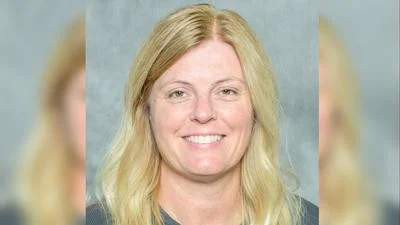On Iowa State University’s campus, a lingering spring sunset reflects off the folded glass façade of the Student Innovation Center. Undergraduates catch glimpses of glass blowers in the Gaffer’s Guild and labs full of 3D printers as they wind up several flights of stairs. On the fourth floor, they join a cluster of students waiting in a hallway. Some rehearse their talking points. Others chomp on a rushed dinner of french fries.
In the “Launch Pad,” Linda Niehm, professor of apparel, events, and hospitality management, and her graduate assistant Emily Schrimpf power up a projector and straighten rows of chairs. Soon, half a dozen student teams will pitch their recommendations for three small businesses in Ames and one in Ankeny after a semester spent assessing the retailer’s needs, researching best practices and brainstorming creative solutions.
While the Retail Ready Challenge is new to the syllabus this semester, supporting family-run, Main Street businesses in Iowa has long been part of Niehm’s upper-level “Entrepreneurship in Human Sciences” class. Since 2004, students have worked with boutiques, cafés, grocery stores, gift shops, pharmacies and other retail- and service-oriented businesses in more than two dozen – mostly rural – communities across Iowa. The innovative approach provides hands-on, experiential learning for students and fresh ideas at no cost to retailers.
“A lot of the businesses we usually work with are from smaller communities. They have limited resources,” says Niehm. “We can't just go in overnight and fix things, but we can plant some seeds, and if other people see business leaders trying new things, they may think, ‘Maybe I could do something different.'”
Strengthening the backbone of rural communities
Planting these seeds, Niehm explains, is part of a larger innovation and entrepreneurship effort at ISU and through its Extension and Outreach to help communities thrive as rural economies and demographics change.
Sixty-four of Iowa’s 77 non-metropolitan counties have fewer residents today than in 1970, according to Liesl Eathington, an assistant scientist in ISU’s Department of Economics and director of the Iowa Community Indicators Program (ICIP).
While rural economies in the U.S. have historically relied on agriculture, mining and manufacturing, their share of rural wage and salary jobs has dropped with increased automation, productivity gains and corporate consolidation, according to a report from the U.S. Department of Agriculture.
Service industries now make up the majority of rural employment, and rural counties with above average population growth rates are largely driven by tourism and recreation, which Niehm points out also involves retail businesses to complement these destinations and experiences.
“Retail has to be part of the local economic development picture. It’s not just about bringing in a factory or some other magic Band-Aid that’s going to save everything,” says Niehm.
As a researcher who has spent almost 20 years working in small towns across Iowa, Niehm says the communities that have thrived under conditions of change have a 'we not me' mindset. Business and community leaders work together to improve the quality of life for their residents and figure out ways to draw people in. Niehm points to the town of Jewell as an example of a small town that has turned itself into a shopping and dining destination in north central Iowa.
Students consulted for The Shed Fitness, Julie’s Designs, Sew Bee It Quilt Shop, and Dirty Kids Soap in Jewell, 2018. Susan Schmitz, Program Coordinator for ISU Extension and Outreach for Hamilton County, says she’s seen an influx of vintage and health care businesses move into the downtown in the last 5-10 years. Some of the businesses she works with have shared that one of their barriers to grow or change is a lack of time. Schmitz says those that participated in the retail outreach project appreciated th
Students consulted for The Shed Fitness, Julie’s Designs, Sew Bee It Quilt Shop, and Dirty Kids Soap in Jewell, 2018. Susan Schmitz, Program Coordinator for ISU Extension and Outreach for Hamilton County, says she’s seen an influx of vintage and health care businesses move into the downtown in the last 5-10 years. Some of the businesses she works with have shared that one of their barriers to grow or change is a lack of time. Schmitz says those that participated in the retail outreach project appreciated the students’ suggestions for online marketing/selling, help prioritizing next steps and thinking outside of the box. Photo courtesy of Susan Schmitz, program coordinator for ISU Extension and Outreach for Hamilton County.
While many businesses were hard hit by the COVID-19 pandemic, Niehm says the last two years generally have bolstered support for shopping local.
“People saw these businesses really step up and find creative ways to continue helping their customers through the lock-down and when people were trying to limit their exposure risk,” says Niehm. “I still get goosebumps thinking about the time I drove down Main Street in Ames in the spring of 2020 and saw the owner of Brown’s Shoe Fit with a chair on the sidewalk so an older woman could sit down and try on a pair of shoes. Amazon wouldn’t do that.”
The pandemic also provided a stark reminder that brick and mortar businesses are more than just places to spend money. They help people feel connected to their community, offering space for people to bump into neighbors, celebrate milestones, exchange ideas and plan for the future.
“Small retailers and a vibrant Main Street are the glue that holds a community together,” says Niehm
Most semesters, Niehm’s class focuses on one or two communities. Local partners, like county program coordinators with ISU Extension and Outreach, identify businesses that would be a good fit and make sure they're on board. They also help organize a tour of the town and lunch discussion with local leaders for the students' first site visit, which Niehm explains, provides the students with a multifaceted view of the community, including its challenges and opportunities and how these affect small businesses.
In 2019, students worked with businesses in Gowrie
In 2019, students worked with businesses in Gowrie: Vicky’s Dance Academy, The Picket Fence, SkyDroneUSA, Marv’s Market Street & Grill, Beek Street Antiques & Collectibles, Jamboree Foods, Liberty Market and Addison James Fashion Boutique. ISU Extension Program Coordinator Linda Cline for Webster County says the town with fewer than 1,000 residents is always looking for ways to put the “Go in Gowrie." Over the last decade, she’s seen more businesses move into the downtown and strong support for the local grocery store, but finding enough workers is a challenge for some.
Photo courtesy of ISU Extension Program Coordinator Linda Cline for Webster County
During the initial community visit, the student teams also meet with their new clients to learn about the business and better understand their specific needs and goals. After a midterm check-in with businessowners, the students return to the community at the end of the semester to present their recommendations and hand off physical and digital copies of their strategy toolkits.
“We call it a toolkit so these businesses can pull out what they need, when they need it, and see some immediate impact,” says Niehm.
As she flips through a thick, spiral bound toolkit created for Jerry Reiter’s Paintings in Oil, Niehm points out the logo the students designed for the Pocahontas business. The toolkit includes step-by-step instructions with screenshots showing how the client can use Canva, the free graphic design website, to add a watermark to photos of paintings he posts online.
Other resources in toolkits have included templates for social media posts, projected budgets for hosting holiday-themed workshops, and instructions for adding a business to Google Maps.
When Graduate Assistant Emily Schrimpf was a student in Niehm’s spring 2019 class, she was part of the consulting team that worked with Greg Benson, owner of Beek Street Antiques & Collectibles in Gowrie in northwest Iowa.
“As part of our toolkit, we made him a website, and then when we were done, we transferred it to his email and provided step-by-step directions with screenshots to make updates,” says Schrimpf. “If students are making digital mock-ups of business cards or social media posts for their toolkits, we really encourage them to hand them over to the business owner at the end of the semester so it’s one less thing they have to create.”
Schrimpf and her team meeting with Greg Benson, owner of Beek Street Antiques & Collectibles in Gowrie, 2019. Photo credit: Ryan Riley/ISU
Emily Schrimpf and her team meeting with Greg Benson, owner of Beek Street Antiques & Collectibles in Gowrie, 2019. Photo by Ryan Riley/Iowa State University
Schrimpf emphasizes that learning anything new takes time – something many small business owners lack.
“One great thing that the students bring into this project is they’re young; they know all about technology, and they can help flatten that learning curve,” says Schrimpf, adding that professional business consultants are costly. “Here, you're getting these young entrepreneurs who want to help, and it is priceless because the businesses don’t have to pay anything.”
Niehm adds, not everyone is a good client candidate for the project.
“The business owner needs to want to do things differently or sees a need for change but doesn’t know how to get there. You can’t force change on someone.”
Niehm says the class has had different community partners and funding sources over the last two decades. With grants from the USDA and Main Street Iowa program from 2005-2011, Niehm collaborated with Professor Ann Marie Fiore and other faculty in the Department of Apparel, Events and Hospitality Management to include business makeovers in the outreach projects. From 2012-2015, Niehm worked with her colleague Jessica Hurst, along with faculty from the College of Design and staff with ISU Extension and Outreach, on outreach projects funded by an Extension grant. ISU Extension and Outreach continues to be a partner.
Janea Blomquist, Pocahontas County Program Coordinator with ISU Extension who worked with the class in fall 2021, says one of the biggest challenges facing small businesses in Pocahontas, a town in northwest Iowa with a population less than 2,000 people, is competition with larger businesses in surrounding areas. Staffing is also an issue for some of the businesses. Photo by Ryan Riley/Iowa State University
Janea Blomquist, Pocahontas County Program Coordinator with ISU Extension who worked with the class in fall 2021, says one of the biggest challenges facing small businesses in Pocahontas, a town in northwest Iowa with a population less than 2,000 people, is competition with larger businesses in surrounding areas. Staffing is also an issue for some of the businesses. Photo by Ryan Riley/Iowa State University
Fresh ideas and innovative solutions
As the light outside the Student Innovation Center shifts to indigo, Niehm opens the door, greeting her students as they grab cookies and drinks before taking a seat.
Niehm explains the class took a slightly different approach with the consulting project this semester. Rather than working with multiple businesses in one community, the student teams created toolkits for one Ames-based entrepreneur who runs four stores: Cooks’ Emporium, ZW Mercantile and Nook & Nest, which has a second location in Ankeny.
“Mindy Bergstrom has been recognized as a small business leader in Iowa and has a real passion for retail. She's already doing a lot of things right with her stores. So, this created a really unique challenge for the students,” says Niehm.
The panel of judges – Bergstrom, her husband Patrick, Store Manager Maria Wagoner, and College of Human Sciences Dean Laura Dunn Jolly – settle into their chairs facing the large projector screen.
Each team gets 10 minutes and 10 slides to present their recommendations for one of Bergstrom’s stores.
After sharing the business’s strengths (e.g., consistent branding, location), threats (e.g., competition from Etsy and big department stores) and weaknesses (e.g., limited storage space), the teams offer at least five strategic suggestions to help address areas Bergstrom or the students have identified as opportunities to improve upon.
One of the teams for Nook & Nest, a home décor and stationary store, recommends working with realtors to stage apartments. Another team outlines the profitability of selling certain items directly through Instagram Shopping, and a third suggests new shelving with cabinets to store more merchandise.
Students Jones Pfeifer, Carly Rahn, Katie Jenkins and Cassie Albers present their recommendations for Nook & Nest during the Retail Ready Challenge in the Student Innovation Center, April 2022. Photo by Laurel Feakes/Iowa State University
Students Jones Pfeifer, Cassie Albers, Katie Jenkins and Carly Rahn present their recommendations for Nook & Nest for the Retail Ready Challenge in the Student Innovation Center at ISU, April 2022. Photo by Laurel Feakes/Iowa State University
To get more ISU students into Cooks’ Emporium, a team suggests Bergstrom invite culinary students to lead some of the cooking classes already offered in the kitchen supply store, saying it could reduce the registration costs and attract a younger demographic. One of the teams for ZW Mercantile, a shop that offers products like re-usable paper towels and a cleaning supply “refillery,” provides a list of eco-events at ISU where Bergstrom could set up a table with some giveaways and information about the store.
After the last presentation and closing remarks, Bergstrom says she appreciated seeing the teams’ creativity.
“There's a lot of potential to expand those ideas, and it was good to hear what students are thinking when they visit the stores," says Bergstom.
She adds that she’s on the Ames Main Street Board of Directors.
“Our goal has always been to gain more students’ awareness that our downtown exists and to see how much our downtown has to offer,” says Bergstrom.
While students make up half of Ames’s population during the academic year, many don’t venture out beyond the peripheries of campus.
Experiential learning and a new mindset
Niehm adds some students in her class hail from small towns in Iowa, but many grew up in more urban and suburban communities.
"When we go to places like Pocahontas or Jewell, it’s a cultural experience for a lot of our students. It can be really impactful for the students to build these connections and learn more about places in Iowa,” says Niehm.
She turns to Schrimpf who grew up in the Twin Cities and asks if she had visited a town with fewer than 1,000 people before the outreach project in Gowrie.
“No, I hadn’t. But now whenever I’m watching the weather segment on the news and see Gowrie or one of these other towns we’ve partnered with, I’m like, ‘Oh, I know this place!’” says Schrimpf.
Linda Niehm, professor of apparel, events, and hospitality management, and Graduate Assistant Emily Schrimpf at the Retail Ready Challenge in the Student Innovation Center at ISU. Photo by Laurel Freakes/Iowa State University
Linda Niehm, professor of apparel, events, and hospitality management, and her graduate assistant, Emily Schrimpf, at the Retail Ready Challenge at the Student Innovation Center at ISU. Photo by Laurel Feakes/Iowa State University
Schrimpf and Niehm also stress the importance of experiential learning that comes with this class as opposed to an assignment for a fictitious case study or hypothetical business.
"This class changed the trajectory of where I thought I was going. There's nothing like being able to help a real person,” says Schrimpf, explaining she’s now pursuing a Ph.D. in the Department of Apparel, Events, and Hospitality Management with a focus on entrepreneurship.
Several students say the consulting projects gave them a better sense of what it takes to run a business. Madison Kosar, a senior majoring in event management and minoring in communications, says she learned how to analyze a business’s cash flows and losses, and figure out if the team’s proposals would generate a profit.
Others talk about the value of working with a client, managing a project, and pitching and presenting their ideas.
Niehm emphasizes that being able to give tangible business examples during an interview for an internship or job is a boon to students.
“How many students can say, ‘I was part of a consulting project where we made recommendations for a real business to help them be more successful?’ That is something you can talk about during an interview that will blow people away,” says Niehm.
Leah Rozendaal, a judge for the CHS Entrepreneurship Showcase also held during Ignite Innovation Week at ISU, is one of Niehm’s former students. In 2017, Rozendaal worked with Café Diem and London Underground in Ames to organize a one-time, large-scale event. She developed promotional materials, including a video for social media.
“Having this type of experience was incredible for my resume when searching for my first job out of college, and the entrepreneurship aspect of the class definitely sparked the "business bug" in me,” says Rozendaal.
After graduating ISU, Rozendaal organized several large events for a golf club and hotel and then launched her own video production company, Leah Rose Productions, full-time in 2018. She’s filmed over 150 weddings since then and has made promotional videos for businesses in Central Iowa.
At the end of every semester, Niehm hopes the students will take an entrepreneurial mindset with them. She stands by the idea that entrepreneurship goes beyond the sole idea of starting a business. It also includes having a vision, being innovative, taking risks, solving problems and being a leader.
“If you have an entrepreneurial mindset, you’re always going to be able to come up with some reasonable solutions. You can adapt and figure out the best path forward,” says Niehm.
Next fall, the class will continue its tradition of rural retail outreach by partnering with Webster City.
Original source can be found here.





 Alerts Sign-up
Alerts Sign-up